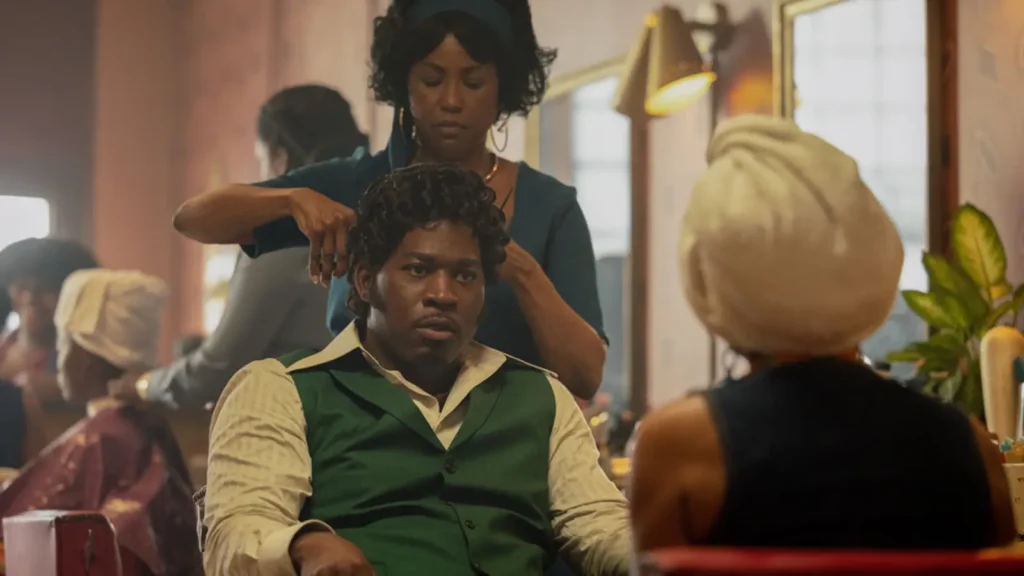David Banner’s career has long defied categorization. A Grammy-nominated rapper, producer, and activist, he has built a reputation for his fearless lyricism, boundary-pushing production, and deep-rooted advocacy for social justice. Yet, in recent years, Banner has expanded his creative repertoire, stepping into the world of acting with the same intensity and charisma that defined his music career. His latest role as “Missouri Slim” in Fight Night: The Million Dollar Heist has garnered praise, not only for his compelling performance but also for the way it channels his artistic evolution.
In this star-studded crime drama, Banner brings to life a complex character who straddles the line between moral ambiguity and loyalty. His portrayal of Missouri Slim is emblematic of a man who is both deeply entrenched in the criminal underworld and yearning for redemption. As Banner navigates this role, he showcases his ability to translate his passion for storytelling from the studio to the screen. But behind this triumph lies a less-publicized narrative of struggle and reinvention—a journey that almost saw Banner walk away from music entirely.
Banner’s Pivot to Acting
“Fight Night: The Million Dollar Heist” is more than just a film; it’s a statement of David Banner’s versatility. Set in the high-stakes world of underground boxing and crime syndicates, the movie follows a group of characters drawn together by a massive heist, each bringing their own agendas and moral dilemmas. Missouri Slim, portrayed by Banner, is a streetwise yet introspective hustler who serves as both an instigator and mediator within the crew’s tense dynamics. He is a man with a murky past, trying to maneuver his way out of a life that has ensnared him for too long.
For Banner, the role of Missouri Slim offered an opportunity to channel elements of his own life experiences. Growing up in Jackson, Mississippi, he witnessed firsthand the struggles and injustices faced by marginalized communities, themes that frequently appeared in his music. In Slim, Banner saw a reflection of those struggles—a character caught between doing what is necessary to survive and aspiring to rise above his circumstances.
In an interview about his role, Banner noted how he drew parallels between Slim’s story and his own journey in the music industry. “There’s a sense of entrapment that both Slim and I have felt at times,” he said. “He’s trapped in this cycle of crime, and I’ve felt trapped by the expectations and limitations people place on artists, especially Black artists.”
Why Banner Nearly Walked Away from Music
David Banner’s success in Fight Night comes at a time when his future in music seemed uncertain. Despite his accolades as a producer and rapper, Banner found himself questioning his place in the industry. “I was at a point where I didn’t know if I wanted to continue making music,” Banner revealed in a recent interview. “I felt like I had more to say, but I wasn’t sure if music was the right platform anymore.”
The pressures of the industry, combined with personal struggles, led Banner to consider stepping away from music altogether. He felt boxed in by a system that often prioritizes commercial success over authentic expression, and his frustration grew as he watched the commodification of hip-hop reach new heights. “It felt like the soul was being sucked out of the music,” Banner said. “I didn’t want to be part of something that didn’t allow me to be fully who I am.”
Banner’s disillusionment with the music industry also stemmed from his desire to address deeper societal issues—something he felt could not be fully achieved through music alone. While tracks like “Cadillac on 22s” and “The God Box” touched on themes of systemic oppression, identity, and empowerment, Banner wanted to explore these narratives in more nuanced and varied ways. Acting, it turned out, provided that avenue.
Transitioning Mediums: A Storyteller’s Evolution
“Fight Night: The Million Dollar Heist” is not Banner’s first foray into acting. He has appeared in several films and TV series, including The Butler (2013) and Empire (2015), often playing roles that delve into themes of power, race, and personal conflict. However, his performance as Missouri Slim marks a turning point, as it allowed Banner to take on a more prominent and nuanced character. The film’s director, Malcolm M. Mays, was particularly impressed with Banner’s ability to bring depth and authenticity to Slim, crediting the rapper’s personal experiences and artistic sensibilities.
“David’s performance is a testament to his understanding of struggle and resilience,” Mays commented. “He wasn’t just acting; he was living the role. He brought a rawness to Slim that made the character feel real, almost like you were watching a documentary rather than a scripted film.”
Banner’s transition from music to film has not been without challenges. Acting requires a different kind of discipline and vulnerability, and for someone used to the controlled environment of a recording studio, it can be a daunting leap. Yet, Banner approached the craft with the same rigor he applies to his music production. He immersed himself in the role, studying the mannerisms and mindset of individuals like Slim, and even shadowed people involved in underground boxing to gain insight into the world his character inhabits.
Missouri Slim: A Mirror to Banner’s Reality
Missouri Slim is a character defined by his contradictions. He’s both a schemer and a philosopher, capable of orchestrating a complex heist while questioning the morality of his actions. This duality resonated deeply with Banner, who has long balanced his role as an entertainer with that of an activist and thinker. Through Slim, Banner explores themes of loyalty, betrayal, and the search for redemption—issues that have shaped his own journey.
The film’s pivotal scenes, where Slim confronts his crew about their motives and lays bare his own vulnerabilities, are some of the most powerful moments in *Fight Night*. Banner’s delivery is understated yet forceful, conveying Slim’s internal struggle without resorting to melodrama. It’s a performance that reveals as much in silence as it does in speech, highlighting Banner’s growth as an actor.
In a particularly poignant scene, Slim reflects on the choices that led him to his current predicament, lamenting, “Every time I think I’m out, they pull me back in.” The line, though seemingly cliché, takes on new meaning in the context of Slim’s—and Banner’s—life. It’s a moment of self-awareness, acknowledging how difficult it is to escape the roles society assigns us, whether as a hustler or a musician.
Music and Acting: Two Sides of the Same Coin
Banner’s venture into acting does not signify a departure from music, but rather an extension of his storytelling. While the mediums differ, the core remains the same: a commitment to exploring the human condition and challenging societal norms. In “Fight Night”, Banner’s performance adds layers to his artistic persona, offering audiences a glimpse into the emotional and psychological depth that has always been present in his music.
Looking ahead, Banner has expressed interest in taking on more roles that allow him to delve into complex characters and narratives. He sees acting as a way to continue his advocacy, using the platform to tell stories that might not otherwise be heard. As he balances music, film, and activism, Banner remains an artist in constant evolution—refusing to be confined by genre or medium.
A New Chapter in a Storied Career
David Banner’s role in “Fight Night: The Million Dollar Heist” is more than just another addition to his resume. It’s a reflection of his ongoing quest for self-discovery and artistic fulfillment. Through Missouri Slim, Banner has found a way to channel his frustrations, hopes, and wisdom into a character that resonates deeply with audiences. His performance, nuanced and powerful, marks a new chapter in a career defined by defiance and reinvention.
For fans and newcomers alike, Banner’s journey from hip-hop to Hollywood serves as a reminder that the best art often emerges from moments of doubt and transformation. As he continues to navigate the intersection of music and film, David Banner proves that he’s not only a master of reinvention but also a storyteller whose voice—whether through lyrics or dialogue—demands to be heard.
No comments yet.








